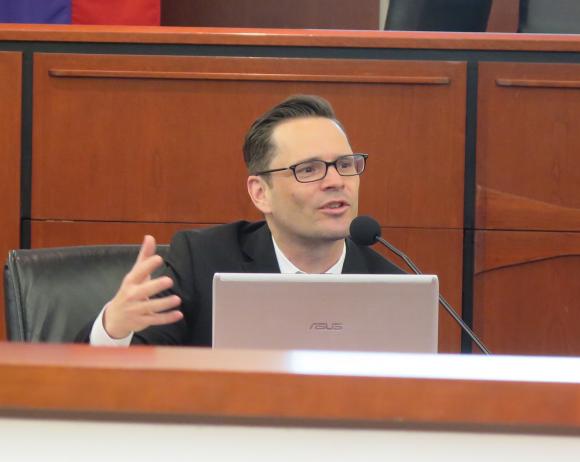
Christopher Peterson, used to work as an advisor for the Consumer Financial Protection Bureau but is now a professor at the University of Utah's Quinney College of Law.
High-profile consumer fraud cases – included illegal practices by Wells Fargo and a judgement against the payday lender CashCall – were among the topics discussed at a half-day conference on consumer-financial protection, sponsored by the Center for Corporate Law and Governance and the Rutgers Institute for Professional Education.
Jeff Ehrlich, Deputy Enforcement Director at the Consumer Financial Protection Bureau, talked about the bureau’s efforts to investigate illegal conduct by banks and other financial institutions. The goal in every case, whether settled or litigated, is to provide relief for consumers and to get institutions into compliance with the law.
“We’ve had a lot of success,” he said, noting that the bureau has obtained almost $12 billion in relief for 29 million people, since it was created after the 2008 financial crisis. Ehrlich said this money is used to compensate harmed consumers when the wrongdoer lacks the resources to pay. These penalties, collected under the Dodd-Frank Act, “provide relief for consumers, who, in the past, would have received nothing,” Ehrlic said. In addition, the bureau has imposed hundreds of millions of dollars in civil penalties.
Much of his talk centered around the investigation into Wells Fargo and its unlawful practices of opening savings and credit-card accounts without customers’ knowledge. He said customers didn’t know accounts were being opened for them and then were hit with fees and other charges. The bureau brought its enforcement action against Wells Fargo along with the Los Angeles City Attorney’s Office and the Comptroller of the Currency. The agencies together imposed $185 million in penalties. The bureau’s investigation found that over a five-year period, 5,300 Wells Fargo employees were fired for their unlawful conduct, but the bureau maintained the bank failed to effectively stop the wrongdoing.
He praised the work of the city attorney’s office, “We each benefitted from the other’s work. The City Attorney’s Office built its case the old-fashioned way: it took sworn statements from harmed consumers and former bank employees, and this contributed to our understanding of the problem” he said. “The bureau, in turn, was able to compel the depositions of high-ranking bank officials, and we forced the bank to turn over to us more than 7,000 documents. We were able to invite the city attorney to our depositions, and we shared with that office all of the information we obtained during our own investigation. Together, we were able to obtain relief for consumers nationwide and to impose important restrictions on the bank’s behavior going forward.”
Christopher Peterson, who worked at the Consumer Financial Protection Bureau as a special advisor and is now a professor at the University of Utah’s Quinney College of Law, talked about the issue of payday lenders, primarily unscrupulous lenders whose interest rates exceed usury limits in many states and who disproportionately target the poor, women, and minorities.
Peterson shared a national map of the location of such lending companies that showed 22,000 locations – growth, he added, that exceeds the popular coffee company, Starbucks. Though payday lenders are banned in some states, including New York, New Jersey, and Maryland, Peterson said it has become a billion-dollar industry.
In the case of CashCall, a court found the company had made loans for years at illegally high interest rates, some as high as 300 percent, exceeding interest rates charged by illegal loan sharks, Peterson noted.
In a ruling handed down in August 2016 in the bureau’s case against CashCall, a federal judge said that loans that violated the laws of 16 states were not collectible. As a result, CashCall’s servicing of the loans was found to be a deceptive practice under the Dodd-Frank Act. CashCall had argued that the loans were not subject to usury limits because they were issued by a partner company of an American Indian tribe and that tribal lenders are not subject to state laws that cap interest rates.
Peterson said additional federal regulations must be made to ensure that consumers are not taken advantage of by such predatory lenders. He argued that banks must do their due diligence on payday lender payment processing and cited a case where a cell-phone company was held liable when their customers were illegally charged in a horoscope scam.
“We need to be developing a list of the actions banks should take to screen out illegal lenders,” he said.
Peterson also advised that before a person takes out a high-interest loan from a pay day lender, that person should consider other options, including borrowing from a credit union, non-profit organization, microloan agency, or even lower-interest credit cards, or, possibly, a pawn shop.
The March 31 conference brought together practitioners, academics, regulators, and legal advisors at Rutgers Law School to discuss “Consumer Financial Protection in a New Era.”Other speakers throughout the day tackled the issues of debt collection in state courts and arbitration clauses in consumer-credit contracts.
Additional speakers included:
- Dalié Jiménez, Associate Professor of Law, Jeremy Bentham Scholar at the University of Connecticut’s School of Law, and former policy fellow at the Consumer Financial Protection Bureau
- Christopher Albin-Lackey, Associate Director, Business and Human Rights, Human Rights Watch
- David McMillin, an attorney with Legal Services of New Jersey
- Andrew R. Wolf, Founder of The Wolf Law Firm, LLC, and Adjunct Professor at Rutgers Law School
- Chrystin Ondersma, Professor of Law at Rutgers Law School.